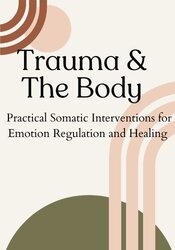

Without skillful intervention, trauma’s devastating symptoms can consume your client's life.
When these symptoms are lodged deep in the body, they can be beyond the reach of your most powerful talk therapy-based interventions…
Leaving even the most seasoned clinician feeling defeated.
But trauma’s effects on the body are NOT a life sentence.
With the right tools, you CAN heal the impact of trauma on the body (without overwhelming or retraumatizing your client).
Now you can join internationally recognized psychologist and trainer Narelle McKenzie, as she shows you step-by-step demonstrations of proven interventions that will get to the heart of the physical manifestations of trauma.
You’ll get expert guidance on how to use assessment, communication, and somatic interventions to bring vibrancy and healing back into the body—and your client’s life.
You’ll also discover simple exercises to understand your own somatic processes and how to incorporate them into your practice with awareness and skill.
Feel confident to apply somatic interventions with trauma clients immediately.
PESI Australia, in collaboration with PESI in the USA, offers quality online continuing professional development events from the leaders in the field at a standard recognized by professional associations including psychology, social work, occupational therapy, alcohol and drug professionals, counselling and psychotherapy. On completion of the training, a Professional Development Certificate is issued after the individual has answered and submitted a quiz and course evaluation. This program is worth 5 hours CPD for points calculation by your association.
| File type | File name | Number of pages | |
|---|---|---|---|
| Trauma & the Body presenter slides 2023 (0.76 MB) | Available after Purchase |

Narelle McKenzie is the Director and a Senior trainer of the Australian Radix Body Centered Training Centre and the Radix Institute, North America, which offers a three-year training program in Radix Body Centered Psychotherapy. She is a registered psychologist with over forty years' experience working in private practice with adults, adolescents, families, couples and groups. She has a Masters in developmental psychology and extensive experience and training in psychotherapy and psychology. As part of her private consultancy Narelle has led experiential and training workshops on Embodied Psychotherapy throughout Australia, the USA and the UK. She is a Clinical Member of the Australian Psychotherapy and Counselling Association (PACFA) Register, a PACFA accredited psychotherapy supervisor, an accredited supervisor for Psychology, a member of the United States Association of Body Psychotherapists as well as a member of Peer Review Committee for the International Journal of Body Psychotherapy.
Speaker Disclosures:
Financial: Narelle McKenzie has employment relationships with the Australian Radix Body Centered Training Centre and the Radix Institute. She receives royalties as a published author. Narelle McKenzie receives a speaking honorarium from PESI, Inc. She has no relevant financial relationships with ineligible organizations.
Non-financial: Narelle McKenzie is a member of the Australian Radix Body Centered Psychotherapy Association, the United States Body Psychotherapy Association, the Australian Association of Psychologists Inc, and the Radix Institute, USA.
Morning Session (includes a short break)
Modes of Therapeutic Intervention
Brief theoretical presentation of the impact of trauma on the body - energetically and physically.
Aspects of body awareness
Loss of self-contact
Reading body awareness or 'body reading'
Autonomic Nervous System (ANS) pulsations, respiration, eye contact
Grounding techniques and tracking
ANS dysregulation and the trauma survival strategies: attach/cry for help, collapse/submit and please/appease.
Use case studies and some simple experiential exercises to convey this aspects of body awareness and reading the body.
Teach participants which significant aspects of the body functioning to pay attention to in their own and their client’s process to enable them to assess the appropriateness of interventions.
Afternoon Session (includes a short break)
Work in small groups or pairs with the specific aim of applying what was taught in the morning session to:
Deepen client’s body awareness or mindfulness,
Implement some somatic corrective experiences to different trauma experiences
Work effectively with the here and now relationship based on what is being experienced by the ‘therapist’ and what is being observed.
Apply some of the above to case examples brought forward by the group
Please wait ...